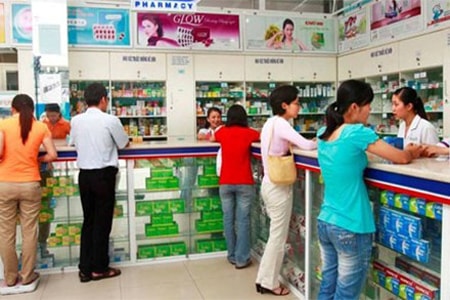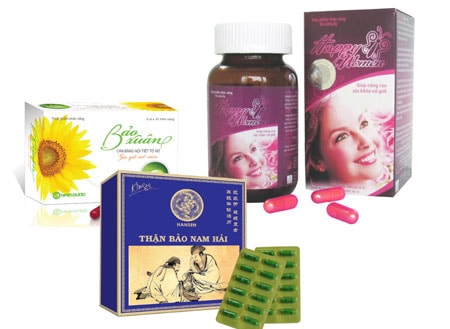Chaotic functional food market
Functional foods (FF) are being used widely. In Vietnam, according to a survey by the Food Safety and Hygiene Department (FSHS) in two major cities, Hanoi and Ho Chi Minh City, over 50% of adults use FF.
However, dietary supplements are being over-advertised, and their quality and prices are uncontrolled. Users mainly rely on the advice of acquaintances, while sellers are not experts…

Choosing dietary supplements at a pharmacy in Ho Chi Minh City - Photo: V. Tuan
Gold mixed with brass!
The dietary supplement market in Vietnam has been likened to “mushrooms growing after the rain” in recent years. Statistics from the Food Safety Department show that Vietnam has about 10,000 dietary supplements, of which about 40% are imported products. From the best to the worst, such as powder, drinks, syrups, porridge, soup, pills, tea... for all subjects from children to the elderly, pregnant women, malnourished and obese people.
Many products are widely advertised as being able to cure cancer and HIV through thank-you letters from patients or television shows introducing patients who have recovered thanks to this food.
Dietary supplements are not only sold vigorously online, but also at pharmacies. Just make a request like helping beautify the skin, blacken hair, etc. and hundreds of products will be introduced by pharmacy staff, from domestically produced to imported products.
At Hai Ba Trung Street, Tan Dinh Market area, District 1 - considered a famous pharmaceutical retail business street in Ho Chi Minh City - when asked about beauty products for women, L pharmacy staff quickly introduced nearly 10 types considered "hot" today such as: Neo-Vita White Plus 180 tablets, priced at 550,000 VND/box; Women's Formula 250 tablets priced at 650,000 VND/box; Sh brand collagen priced at 700,000 VND/box...
Also at this pharmacy, there are nearly 20 types of dietary supplements for men with sky-high prices. For example, the price for one month of using dietary supplements to maintain male vitality such as: Rocket 1h is 1.125 million VND; Genshu 1.104 million VND; M-Phe 1 million VND; Thien ma nhuc thung dung 925,000 VND; Khang Hy duoc 810,000 VND; ginseng antler kidney tonic: 768,000 VND; Alipas 560,000 VND. Products advertised as "restoring physiological beauty for women" are also equally high priced. The price for one month of use of Spacaps: 1.2 million VND; Happy Women: 1.170 million VND; Hoa Thien skin care: 990,000 VND; Angela: 570,000 VND; To nu nhat nhat: 496,800 VND...
Not only are there dietary supplements in pill, drink, powder form..., recently, targeting women's weakness in breast size, a type of cake called Fcup cookies from Japan has appeared on the market, advertised as... breast enlargement without the need for cosmetic surgery!
The price of this cake is 1,999,000 VND/box. According to the advertisement, just eat 2 pieces a day and your bust will grow. It is worth mentioning that although there is no specific clinical trial report and verification, the seller still guarantees 100% effectiveness and explains that it contains an active ingredient from a herb called Pueraria Mirifica, which has the effect of stimulating breast tissue growth.
Pueraria mirifica is an estrogen precursor also found in soybeans. However, according to pharmacists, it is very difficult to extract this substance because it decomposes at high temperatures, so even though it is present in soybeans, when processed into water, there is very little of this substance left. Not to mention that during the processing, this substance can transform into another substance, and it is not known whether it is still effective or not...

Dietary supplements have developed rapidly in recent years. - Photo: V.Tuan
Race to make dietary supplements!
Statistics from the Vietnam Dietary Supplement Association show that in 2000, there were only 60 dietary supplement products imported into Vietnam by 15 establishments, but by the end of 2010, there were 3,700 dietary supplement products on the market imported and produced by 1,626 establishments.
According to Associate Professor Dr. Tran Dang - Chairman of the Vietnam Dietary Supplement Association - currently, Vietnam has 1,781 manufacturing and trading enterprises with more than 10,000 products present in the country. In 2007, the proportion of imported dietary supplements accounted for 65% of the market, but now 65% of dietary supplements are produced domestically. Dr. Tran Quang Trung - Director of the Department of Food Safety and Hygiene - said that consumers, from being ignorant, are now used to using dietary supplements.
Realizing that dietary supplements are a fertile land, more than 90% of enterprises that have long been simply producing pharmaceuticals have quickly joined the production, import and trading of dietary supplements. This has made the production and import of dietary supplements chaotic. More prominently, many companies have established multi-level sales systems, attracting many participants, creating chaotic distribution channels with a series of fraud cases discovered recently.
The most typical example is the incident at Agel VN Company, which operated as a multi-level marketing company for dietary supplements, and withdrew from the Vietnamese market in 2011 after three years of operation. It was shown that just one branch of the Agel multi-level distribution network had 22,000 members. Each member of this network spent from 5 to 15 million VND to buy Agel products.
According to experts from the Food Safety Department, most dietary supplements are advertised by multi-level marketing companies as miracle drugs to attract consumers. With multi-level marketing, the “agents” entice and propagate others by exaggerating the effectiveness of the products that can cure cancer and HIV; meanwhile, these products have not provided scientific evidence of clinical trials.
Dr. Nguyen Thanh Phong - Deputy Director of the Department of Food Safety and Hygiene - emphasized: "It is impossible that dietary supplements can cure cancer or HIV/AIDS. Because of believing in deceptive advertisements, patients instead of going to the hospital for treatment, they trust dietary supplements, skipping the "golden time" for treatment, losing the chance to live. This is truly a crime, not just a simple commercial fraud."
Agreeing with the above viewpoint, Associate Professor, Dr. Le Van Truyen - senior pharmaceutical expert, former Deputy Minister of Health - said that currently, the excessive advertising of dietary supplements is still not managed. The situation of widespread advertising, excessive use or confusion between support and treatment makes consumers confused. However, monitoring and handling are very limited. According to the Department of Food Safety and Hygiene, in 2009, only 1 case of excessive advertising of uses was punished, in 2011 only 29 cases were punished and in the first 3 months of 2012, 17 cases were punished.
According to Laodong-M






